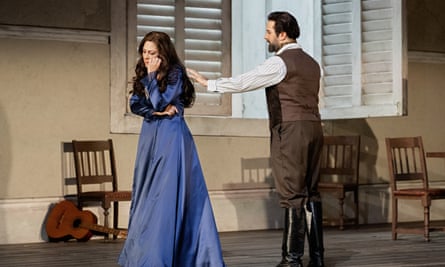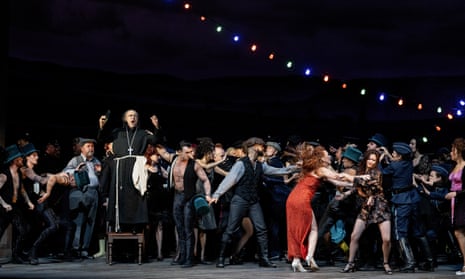Reimagining Verdi’s great tragedy of guilt, obsession and the implacable nature of fate in terms of 20th century military conflict and its aftermath, Christof Loy’s 2019 staging of La Forza del Destino returns to Covent Garden for its first revival, overseen by Loy’s associate director, Georg Zlabinger, and conducted by Mark Elder. There have been a few changes of emphasis in accommodating its new cast, and a few of its rougher edges have been smoothed out.
Padre Guardiano (Evgeny Stavinsky) is now a charismatically zealous young priest rather than the more traditional mature abbot (played by Ferruccio Furlanetto when the staging was new). Loy’s use of film to replay the traumatic past events that colour present lives strikes me as more cogently integrated than before, and the big dance routines, reworked by Klevis Elmazaj and reminiscent of Oh, What a Lovely War!, are more slickly and sexily done. It remains, however, unsteadily poised between psychological realism and the stylisation of cabaret or revue.

There are musical strengths and weaknesses, too. Alvaro and Leonora are played by Brian Jagde and Sondra Radvanovsky. Both have big voices, and both can unquestionably be thrilling, though Jagde’s full-throttle approach can seem unyielding on occasion, and there are times when he could sing more softly than he does. Radvanovsky can also unleash the decibels when she wants or needs to, but she is at her most persuasive in moments of quiet reflection, graciously floating the long phrases of La Vergine degli Angeli, and producing some exquisitely calculated pianissimos in Pace, Pace Mio Dio later on.
Both, however, ultimately yield pride of place to Etienne Dupuis, who gives the evening’s great performance as Carlo, a beautifully realised portrait of a man in the grip of an unswerving obsession, sung and acted with often breathtaking subtlety and always keeping us on the right side of empathy. (Note Dupuis is not singing in every performance: check Royal Opera’s website for cast details.) Stavinsky sounds ideally fervent in his scenes with Radvanovsky: this is another superb voice, admirably warm and sonorous. Rodion Pogossov’s Melitone is less funny than some, though Vasilisa Berzhanskaya makes a spirited Preziosilla, admirably secure over the role’s wide range, and throwing herself into Elmazaj’s big routines with relish.
Elder, meanwhile, always excellent in Verdi, conducts with an impeccable sense of the work’s escalating dramatic tensions. On fine form for him, the ROH orchestra play with wonderful richness of detail: there’s a lovely sheen in the strings and some superbly focused woodwind solos. The choral singing is terrific throughout.

Comments (…)
Sign in or create your Guardian account to join the discussion